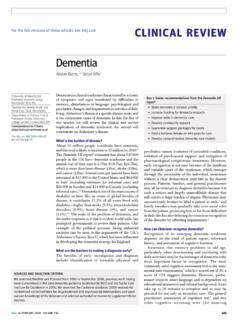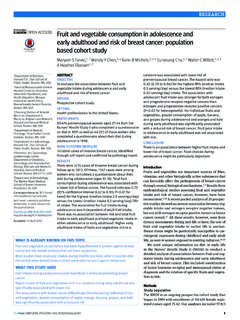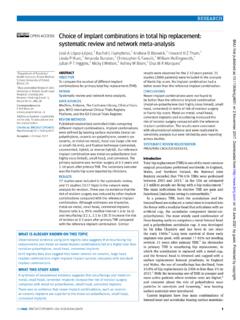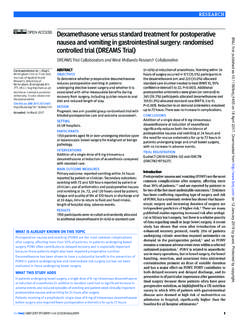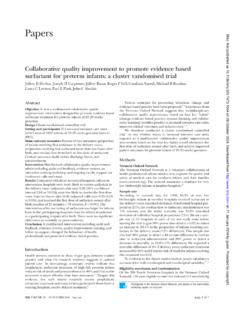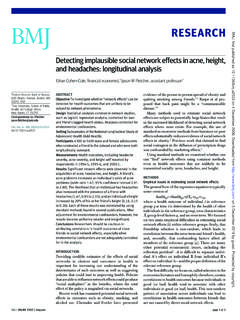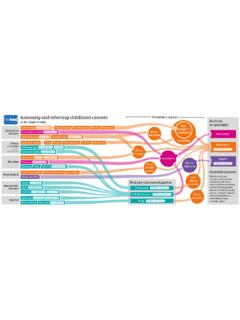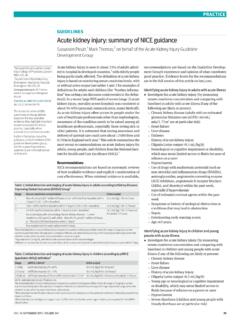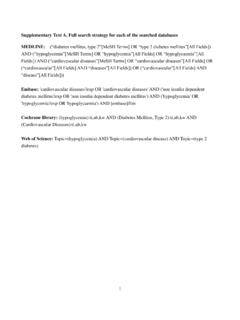Transcription of Drug treatment for panic disorder with or without ...
1 RESEARCHthe bmj | BMJ 2022;376:e066084 | doi: 1 Drug treatment for panic disorder with or without agoraphobia: systematic review and network meta-analysis of randomised controlled trialsNatasha Chawla,1 Thunyarat Anothaisintawee,1,2 Kridsada Charoenrungrueangchai,1 Papan Thaipisuttikul,3 Gareth J McKay,4 John Attia,5 Ammarin Thakkinstian2 ABSTRACTOBJECTIVETo identify drug classes and individual selective serotonin reuptake inhibitors (SSRIs) with high rates of remission and low risk of adverse events in the treatment of panic disorder with or without review and network SOURCESE mbase, Medline, and from inception to 17 June CRITERIA FOR STUDY SELECTIONR andomised controlled trials that included adults aged 18 years with a diagnosis of panic disorder , compared drugs used to treat the panic disorder , and measured the outcomes of interest, including remissions, dropouts, and adverse of bias in the included studies was assessed using the revised Cochrane risk of bias tool for randomised trials.
2 Direct meta-analyses were performed using random effects models. A two stage network meta-analysis with surface under the cumulative ranking curve (SUCRA) was used to estimate the comparative efficacy of drug classes and individual studies including a total of 12 800 participants and 12 drug classes were eligible for inclusion. Almost all the studies (86/87) had some concern or were at high risk of bias. Network meta-analysis of remission with consistent results indicated that tricyclic antidepressants, benzodiazepines, monoamine oxidase inhibitors, SSRIs, and serotonin-noradrenaline reuptake inhibitors (SNRIs) were associated with significantly higher remission rates than placebo, with risk ratios of (95% confidence interval to ), ( to ), ( to ), ( to ), and ( to ), respectively.
3 SUCRAs identified benzodiazepines ( , mean rank= ), tricyclic antidepressants ( , ), and SSRIs ( , ) as the top three best treatments for remission. However, tricyclic antidepressants, benzodiazepines, and SSRIs were also significantly associated with increased risk of adverse events compared with placebo, with risk ratios of ( to ), ( to ), and ( to ), respectively. Consistency assumption of adverse events was upheld but could still be present on removal of studies with high percentages of women participants and those with agoraphobia. A SUCRA cluster ranking plot considering both remission and adverse events among all drug classes indicated that SSRIs were associated with high remission and low risk of adverse events. Among individual SSRIs, sertraline and escitalopram provided high remission with an acceptable risk of adverse findings suggest that SSRIs provide high rates of remission with low risk of adverse events for the treatment of panic disorder .
4 Among SSRIs, sertraline and escitalopram were associated with high remission and low risk of adverse events. The findings were, however, based on studies of moderate to very low certainty levels of evidence, mostly as a result of within study bias, inconsistency, and imprecision of the findings review REGISTRATIONPROSPERO lifetime prevalence of the common psychological problem known as panic disorder is between 1% and 5%.1 2 panic disorder is characterised by recurrent and unexpected panic attacks associated with several comorbid psychiatric and non-psychiatric conditions2 such as anxiety, depression, and cardiovascular diseases3 4 and impairment of social, work, and family Agoraphobia is a strong fear or anxiety provoked by real or anticipated exposure to a wide range of situations and is often associated with panic disorder .
5 Successive revisions of the Diagnostic and Statistical Manual of Mental Disorders (DSM-III, DSM-III-R, and DSM-IV) provide similar definitions of panic 1 Department of Family Medicine, Faculty of Medicine, Ramathibodi Hospital, Mahidol University, Bangkok, Thailand2 Department of Clinical Epidemiology and Biostatistics, Faculty of Medicine, Ramathibodi Hospital, Mahidol University, Bangkok, Thailand3 Department of Psychiatry, Faculty of Medicine, Ramathibodi Hospital, Mahidol University, Bangkok, Thailand4 Centre for Public Health, School of Medicine, Dentistry, and Biomedical Sciences, Queen s University Belfast, Belfast, Ireland, UK5 School of Medicine and Public Health, University of Newcastle, Callaghan, NSW, AustraliaCorrespondence to: T Anothaisintawee (ORCID 0000-0003-1002-8536)Additional material is published online only.
6 To view please visit the journal this as: BMJ 2022;376:e066084 bmj-2021-066084 Accepted: 25 November 2021 WHAT IS ALREADY KNOWN ON THIS TOPICS everal guidelines recommend selective serotonin reuptake inhibitors (SSRIs) as the primary treatment for panic disorderIt is unclear which SSRI is most efficacious because of limited evidence of direct comparisons amongst SSRIs and between SSRIs and other drug classesWHAT THIS STUDY ADDSSSRIs were associated with high rate of remission and low risk of adverse events in the treatment of panic disorder , and among individual SSRIs, sertraline and escitalopram provided high remission with low risk of adverse eventsSerotonin-noradrenaline reuptake inhibitors, monoamine oxidase inhibitors, and noradrenaline reuptake inhibitors showed promising efficacy in remission and acceptability in risk of adverse eventsThe findings were represented by moderate to very low levels of certainty.
7 Suggesting cautious consideration of the use of evidence on 16 March 2022 by guest. Protected by : first published as on 19 January 2022. Downloaded from RESEARCH2 doi: | BMJ 2022;376:e066084 | the bmjdisorder, refined with each new edition; but in the fifth revision (DSM-5) panic disorder and agoraphobia have been defined drug treatments are available for panic disorder , including tricyclic antidepressants, benzodiazepines, selective serotonin reuptake inhibitors (SSRIs), monoamine oxidase inhibitors, and serotonin-noradrenaline reuptake inhibitors (SNRIs).6 Findings from previous systematic reviews and direct meta-analyses suggest these treatments are more effective in reducing panic symptoms than placebo, but tricyclic antidepressants and benzodiazepines are linked with a significantly higher risk of adverse 8 As a result several guidelines recommend SSRIs as the primary treatment owing to their preferable long term safety over benzodiazepines and tricyclic 9 10 Nevertheless.
8 It remains unclear which SSRI is most efficacious and is associated with the lowest risk of adverse events given the limited availability of direct comparisons between SSRIs and other drug meta-analysis is used to indirectly synthesise evidence on all possible treatments using direct comparisons with common comparators. Although several systematic reviews and direct meta-analyses of panic disorder have been published over the past decade, a network meta-analysis that simultaneously estimates relative efficacy and safety between commonly available drug treatments (eg, tricyclic antidepressants, benzodiazepines, SSRIs, SNRIs, monoamine oxidate inhibitors) has not been undertaken.
9 We therefore conducted a systematic review and network meta-analysis to identify which drug classes tricyclic antidepressants, benzodiazepines, blockers, monoamine oxidase inhibitors, noradrenaline and dopamine reuptake inhibitor (ie, buspirone), SSRIs, SNRIs, noradrenaline reuptake inhibitors, and noradrenergic and specific serotonergic antidepressants provided high benefits (remission) and low risk (adverse events) for the treatment of panic disorder . Although guidelines usually recommend SSRIs as the preferred drugs for the treatment of panic disorder , evidence to indicate the most appropriate SSRI is inadequate; thus, we also undertook a network meta-analysis to compare individual SSRIs (eg, fluoxetine, fluvoxamine, paroxetine, sertraline, escitalopram, and citalopram).
10 MethodsThis systematic review and network meta-analysis was reported according to the preferred reporting Items for systematic Reviews and meta -Analyses guidelines (PRISMA).11 12 Relevant studies were identified from Medline through PubMed and Embase from inception to 17 June 2021. The search terms were constructed according to population (eg, panic disorder , panic ) and intervention domains (eg, benzodiazepine, SSRI, SNRI). Supplementary appendix 1 provides details of the search terms and search strategies. For searching in PubMed, we used the filter function to select only randomised controlled trials and phase I-IV clinical trials. was also searched to identify ongoing trials.
